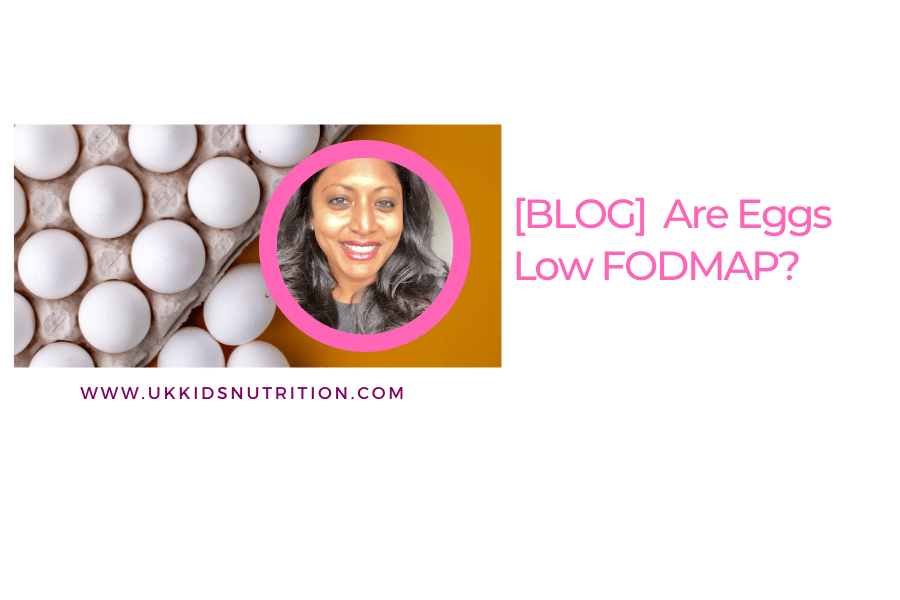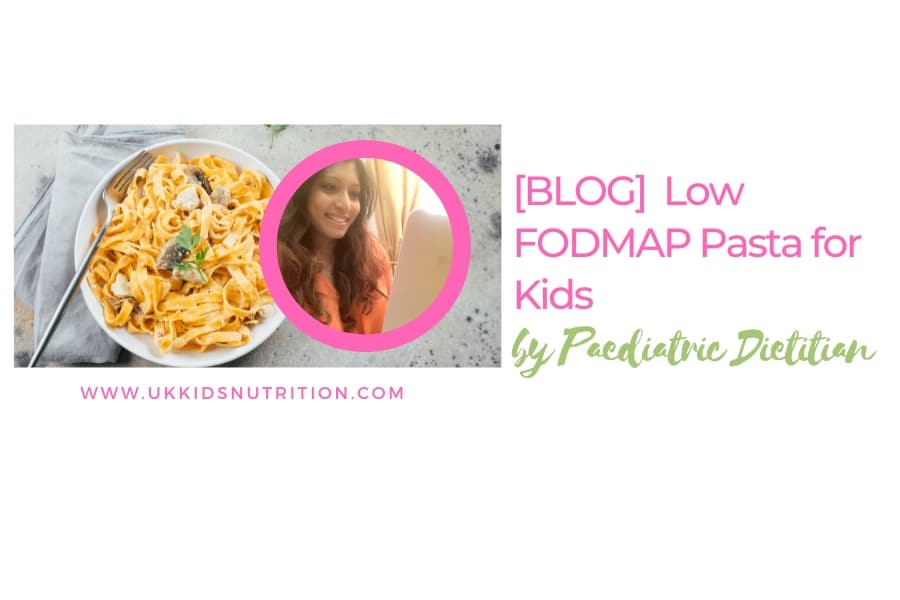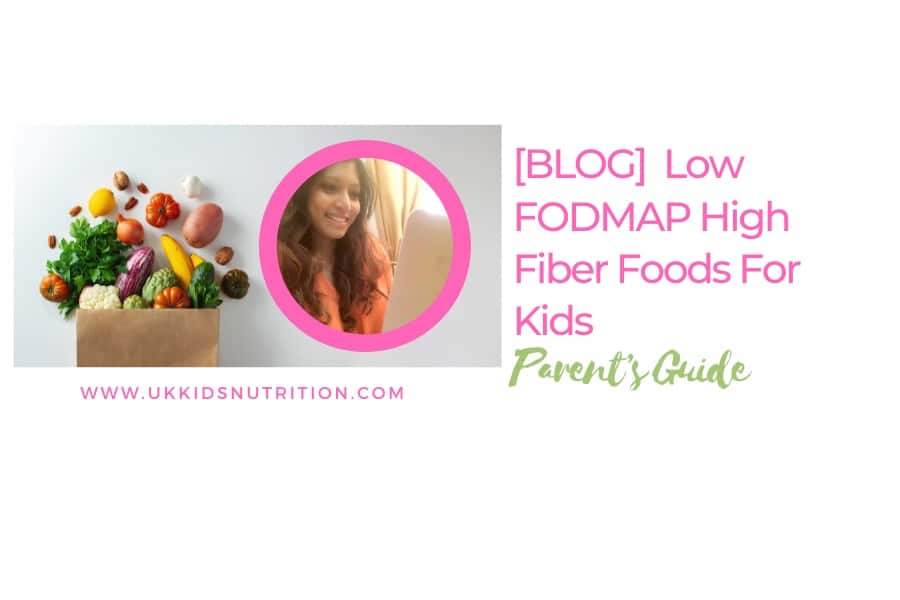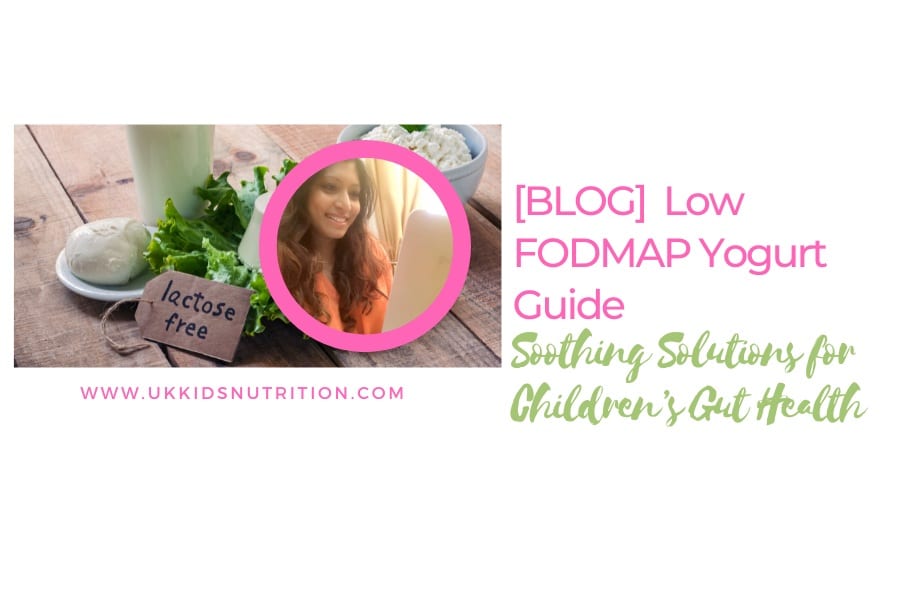If you’re a parent of a child or teenager with Irritable Bowel Syndrome (IBS), you may have asked yourself the burning question: are eggs a low FODMAP food?
Well, wonder no more!
In this blog post, we’re diving into the topic of eggs and IBS.
I’ll answer all your questions about whether or not eggs are safe for your child’s low FODMAP diet trial.
You’ll also get tips and recommendations on how to incorporate eggs into your child’s diet without triggering their IBS symptoms.
So, grab a cup of tea and let’s solve the mystery together!
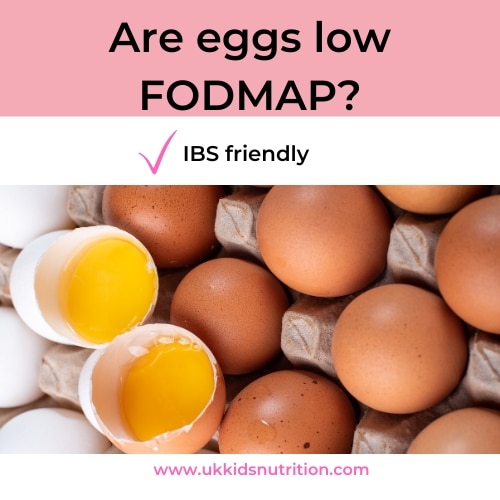
Are Eggs a Low FODMAP Food?
If you’re wondering if eggs fit into a low FODMAP diet trial, the answer is a resounding yes!
Eggs are an excellent source of protein that’s low in FODMAPs, making them a fantastic option for children and teenagers with IBS following a low FODMAP diet.
They can also be a tasty and easy-to-prepare snack that’s gentle on the tummy.
For example, you can whip up some egg sandwiches or boil a batch of eggs to keep in the fridge for after-school snacking.
With eggs in the mix, your child won’t have to miss out on tasty treats even when following a low FODMAP diet.
Understanding FODMAPs and the Low FODMAP Diet
What is FODMAP?
FODMAPs are a group of carbohydrates that are not easily digested by the body.
They can cause a range of digestive symptoms in children and adults.
The acronym FODMAP stands for Fermentable Oligosaccharides, Disaccharides, Monosaccharides, and Polyols.
These carbohydrates can be found in a variety of foods, including fruits, vegetables, grains and dairy products.
When these FODMAPs are not absorbed properly, they are fermented in the gut.
This leads to symptoms like bloating, gas, abdominal pain and a change in stool pattern.
The Low FODMAP diet is a dietary approach that is effective in managing acute IBS symptoms.
In this process, you begin by eliminating high-FODMAP foods.
Then you’ll gradually reintroduce them to determine your child’s tolerance levels.
So, if you are wondering are eggs a low fodmap food then keep reading to find out why!
How does the low FODMAP diet work?
The low FODMAP diet involves avoiding foods that are high in FODMAPs for a short period.
This helps to reduce symptoms of IBS, during the period of gut rest.
After this elimination period, FODMAPs are gradually reintroduced to see which ones are well-tolerated and which ones should be avoided.
.
Low FODMAP Foods
Some examples of low FODMAP foods that can be included in a low FODMAP diet for children with IBS include:
- Proteins: chicken, fish, beef, pork, tofu, tempeh
- Dairy: lactose-free milk, hard cheeses, butter, and other low-lactose dairy foods
- Grains: gluten-free bread, rice, quinoa, oats
- Vegetables: carrots, cucumbers, lettuce, spinach, zucchini
- Fruits: blueberries, kiwifruit, oranges, clementines
- Nuts and seeds: almonds, walnuts, pumpkin seeds, chia seeds
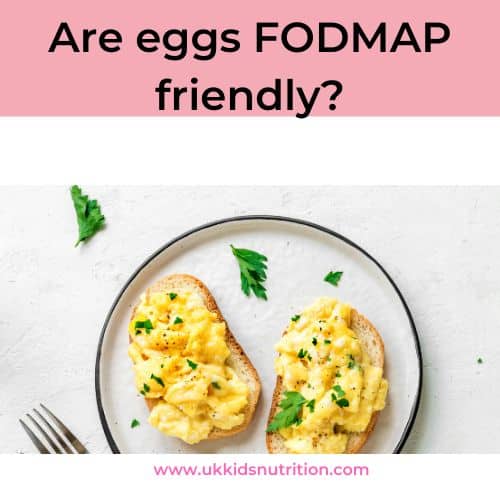
Are Eggs Low FODMAP?
Still curious about whether eggs are low FODMAP?
The good news is that eggs are indeed low FODMAP.
This means they can be a great addition to a low FODMAP diet trial for children and teenagers with IBS.
Not only are eggs a low FODMAP food, but they are also a great source of protein and vitamins.
They also contain no FODMAPs which makes them a safe option for those on a low FODMAP diet.
Here’s how your child can enjoy eggs while on a low FODMAP diet trial:
- Hard-boiled eggs with low FODMAP toast
- Scrambled eggs with spinach and tomatoes
- Omelette with low FODMAP vegetables such as bell peppers and broccoli.
Don’t let IBS symptoms stop you or your child from enjoying eggs.
With their low FODMAP content, they can be a delicious and nutritious addition to a well-balanced diet.
Are Eggs on FODMAP Diet?
Yes, eggs can be included in a low FODMAP diet for IBS.
They’re a nutritious, low-FODMAP protein source that can be enjoyed in a variety of ways.
They also make a great low fodmap snack for children.
Low FODMAP Breakfast with Eggs
If you’re looking for low FODMAP breakfast ideas, eggs are a great option.
They’re a good source of protein to support the growing requirements of toddlers, school-aged children and teenagers.
They can be prepared in a variety of ways so look for recipes with low FODMAP vegetables and grains.
Are Fried Eggs Low FODMAP?
Fried eggs are also low in FODMAPs.
Oils and butter do not contain FODMAPs so you’ll be pleased to know that your child can enjoy fried eggs.
If you’re concerned about the FODMAP content of your child’s meal, consider pairing fried eggs with low FODMAP ingredients like rice, potato or tummy friendly bread.
This will add flavour and nutritional value to the meal while keeping it low in FODMAPs.
Remember, it’s all about finding the right balance and listening to your child’s body.
Are Omelettes Low FODMAP?
Omelettes can be low FODMAP if they are made with low FODMAP ingredients.
Some low FODMAP ingredients that you can add to your omelette include spinach, bell peppers and hard cheese.
Avoid high FODMAP ingredients such as onions and mushrooms during the elimination phase.
Are Hard boiled or soft boiled eggs better on low FODMAP?
Both hardboiled and softboiled eggs are low in FODMAPs and can be enjoyed on a low FODMAP diet.
However, if you find that your child is a picky eater and does not like runny textures, start with hard-boiled eggs first.
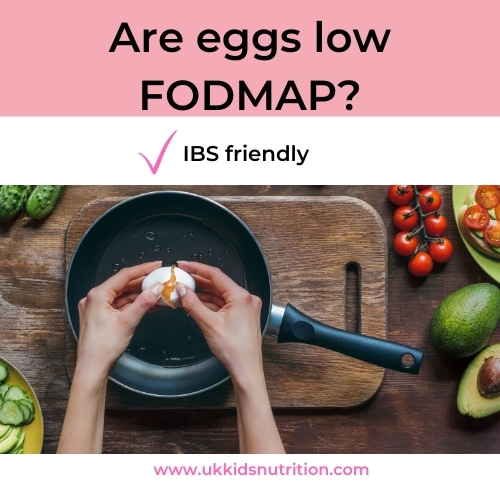
Can You Scramble Eggs On Low FODMAP Diets?
Yes, scrambled eggs are low in FODMAPs and can be enjoyed on a low FODMAP diet.
It’s best to use low FODMAP ingredients such as chives or spring onions (green part only) for flavour, and a low FODMAP cooking oil such as olive oil or another vegetable oil.
Are Eggs IBS Friendly?
Eggs are generally considered IBS friendly, as they’re easy to digest and don’t contain any FODMAPs.
However, some children with IBS may still experience symptoms after eating eggs.
The most likely reason will be due to the presence of other high FODMAP foods in the meal.
Consult with your IBS pediatric dietitian who can help you identify your child’s unique trigger foods.
Why Do Eggs Trigger IBS
Let’s clarify something first – eggs don’t trigger IBS symptoms.
Eggs are considered a low FODMAP food and can be included in a low-FODMAP diet for children and teenagers with IBS.
However, if your child has an egg allergy, it’s crucial to avoid eggs altogether as they can cause an allergic reaction.
It’s also important to note that certain foods that contain eggs as an ingredient may include high FODMAP foods and may not be completely free from high FODMAP foods.
In such cases, it’s best to check the ingredients list or speak with your IBS paediatric dietitian to determine if it’s suitable for your child’s low FODMAP diet.

Do eggs cause constipation?
Are you wondering if eggs can cause constipation?
Well, the good news is that eggs aren’t usually known to be the culprit behind a sluggish digestive system.
In fact, eggs are a great source of protein and are considered a low FODMAP food.
This means that they are a suitable option for children who have IBS and often struggle with constipation.
But, here’s the thing – everyone’s digestive system is unique, and what may cause constipation for one child might not affect another child.
So, if your child is experiencing digestive issues related to egg consumption, it’s always best to speak with your IBS paediatric dietitian.
They’ll be able to determine the underlying cause and suggest an appropriate treatment plan for your child.
Are eggs good for constipation?
Does your child love eggs but you’re worried about can eggs cause constipation?
If your child doesn’t have an immediate or non-IgE-mediated allergy to eggs, then breathe a sigh of relief and confidently include eggs in their diet.
Eggs are not only delicious, but they’re also a great source of protein, vitamin B12, riboflavin (vitamin B2) and selenium that growing bodies need.
The best part? Eggs are low in FODMAPs, which means they don’t contain fermentable carbohydrates that can upset their bellies.
So, if your child struggles with constipation and their diet is limited, adding eggs to their meals can improve the overall nutrition profile of their diet.
Remember, a balanced diet and healthy lifestyle factors can also play a big role in maintaining good digestive health.
Encourage your child to stay active, drink plenty of water, and eat a variety of fibre-rich foods to promote healthy digestion.
And don’t forget to enjoy those eggs for constipation – they’re a nutritious and tasty addition to any meal!

Can Eggs Cause Diarrhea?
Does your child have diarrhoea and irritable bowel syndrome (IBS)?
Then you may be wondering whether eggs can cause diarrhoea.
Firstly, it’s essential to identify whether your child has an egg allergy, which can cause diarrhoea and other symptoms such as hives, vomiting and stomach cramps.
While egg allergies are more common in children than adults, they can occur in teenagers and adults too.
However, if your child doesn’t have an egg allergy, the diarrhoea is usually linked to high FODMAP foods consumed with eggs.
Remember FODMAPs are fermentable carbohydrates that some children have trouble tolerating.
The trouble is that they are present in many foods hidden in the form of unsuspecting ingredients like onions and garlic.
Eggs, on the other hand, are a low FODMAP food that can provide essential protein for growing bodies.
Adding eggs can help expand your child’s diet if they are struggling with constipation and a restricted diet.
Remember that every child’s digestive system is unique, and what works for one child may not work for another.
It’s always best to consult with your family doctor and an IBS paediatric dietitian.
They will show you how to determine the underlying cause of your child’s diarrhoea and the appropriate treatment plan.
Bottomline
In conclusion, eggs are low FODMAP and can be safely consumed by children and teenagers with IBS who are following a low FODMAP diet.
With their high protein and vitamin content and versatility in cooking, eggs can be a nutritious addition to any meal or snack.
When you work with a paediatric dietitian, specialising in IBS, they may recommend a trial of the modified low FODMAP diet trial.
This is one method that you can use to help your child manage their IBS symptoms and enjoy a wide variety of delicious foods.
To learn more about how you can solve tummy pain, bloating, constipation and loose stools for your child, learn more about my Happy Belly Club.

Let Me Help
Would you like to meet a children’s dietitian who has successfully helped families solve their nutrition problems from around the world?
No matter what you are worried about, I’ll help you manage these with confidence.
